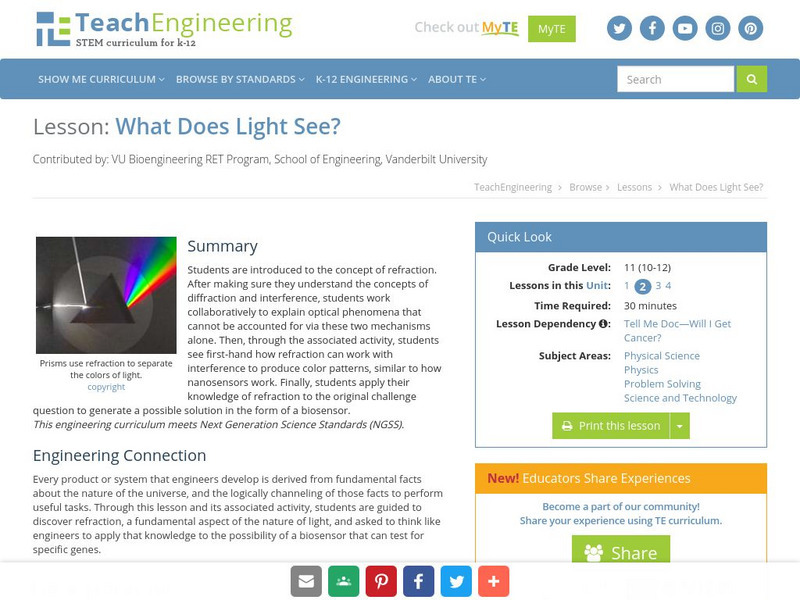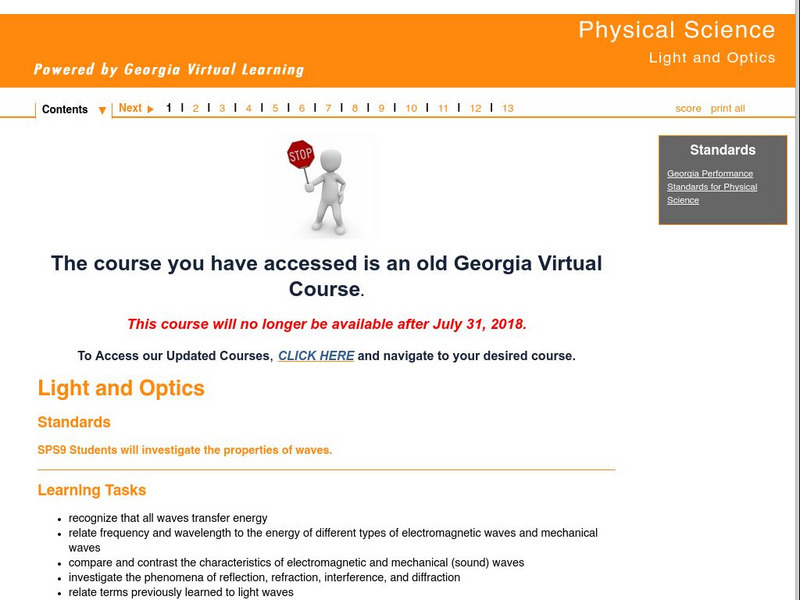Hi, what do you want to do?
Curated OER
Light - Stop Faking It!
This well-designed presentation covers many important aspects of the science behind light. In it, pupils view slides that have a lot of the important vocabulary associated with science, slides of famous scientists who made important...
Curated OER
THE MANY COLORS OF SUNLIGHT
Students examine rainbow components, spectral colors, colors perceived by the eye, hot solids, glowing rarefied gas, absorption, that light is a wave, and optics.
Curated OER
Jell-O Optics
Young scholars observe an activity with Jell-O to learn about optics. In this investigative lesson plan students fill out a handout on the activity that helps them to investigate the index of refraction and the speed of light.
Curated OER
What Role Does Light Play Within the Vision Process?
Students are introduced to the relationship between light and vision. In groups, they participate in experiments to discover how different wavelengths are divided in the visible spectrum. They record their answers and discuss their...
Curated OER
Physical Optics: The Wave Nature of Light
Students are introduced to the wave nature of light. In groups, they discuss Young's experiment and how diffraction and interference demonstrate the wave nature of light. Using examples, they show constructive and destructive...
Curated OER
Spectral Surprise
Learners create spectral colors. In this hands-on science instructional activity, students examine the electromagnetic spectrum as they follow steps to create a model that separates and displays light.
Curated OER
(S-4) The Many Colors of Sunlight
Students observe and explore the characteristics of light.
Curated OER
Spectral Surprise
Students experience a model that produces, separating, and displaying spectral colors.
Curated OER
Enlightening Explorations, Part III
Sixth graders continue their examination of light. In groups, they make rainbows and examine the spectrum of visible light. They travel between various stations recording their observations about the behaviors of light. To end the...
Curated OER
E3 Project Instructional Plan: Light
Eleventh graders investigate the nature of light. In this physics lesson, 11th graders determine how light intensity varies with the distance of the light source.
Physics Classroom
The Physics Classroom: Sound Waves & Music: Reflection, Refraction, Diffraction
In this illustrated physics tutorial, students learn about sound wave behaviors and apply them to the reflection, diffraction, and refraction of sound waves.
TeachEngineering
Teach Engineering: What Does Light See?
Learners are introduced to the concept of refraction. After making sure they understand the concepts of diffraction and interference, students work collaboratively to explain optical phenomena that cannot be accounted for via these two...
Physics Classroom
The Physics Classroom: Light Waves and Color
The behavior of light waves is introduced and discussed. Also, polarization, color, diffraction, and interference are introduced and discussed thoroughly as supporting evidence of the wave nature of light.
Georgia Department of Education
Ga Virtual Learning: Physical Science: Light and Optics
Students will investigate the properties of light waves. They will learn about the different types of electromagnetic waves and mechanical waves, and investigate the phenomena of reflection, refraction, interference, and diffraction.
TeachEngineering
Teach Engineering: Learning Light's Properties
Students learn the basic properties of light--the concepts of light absorption, transmission, reflection and refraction, as well as the behavior of light during interference. Lecture information briefly addresses the electromagnetic...
Physics Classroom
The Physics Classroom: Refraction/ray Model of Light: Light Dispersion Prisms
A tutorial which introduces students to the dispersion of light in more detail, and investigates the reasons why different frequencies of light bend or refract different amounts when passing through the prism.
BBC
Bbc: Gcse Bitesize: Why Do Scientists Think That Light and Sound Are Waves?
Light travels as transverse waves and can travel through a vacuum. Sound travels as longitudinal waves and needs to travel through a solid, liquid or gas. Read about the properties of light and of sound, and learn the differences between...
University of Illinois
University of Illinois Urbana Champaign: Light and Optics
Rainbows and sunsets are called "atmospheric optics". They can be caused by light being absorbed, reflected, scattered, refracted, or diffracted by particles in the atmosphere. Learn all about different atmospheric optics along with...
Cosmo Learning
Cosmo Learning: Physics Iii: Vibrations and Waves
A collection of video lectures from a physics course focusing on vibration and waves taught at the Massachusetts Institute of Technology. The course overviews topics dealing with mechanical vibration and waves with twenty-three lectures....
Physics Classroom
The Physics Classroom: Wavelike Behaviors of Light
How light waves demonstrate their wave nature by reflection, refraction, and diffraction.
Physics Classroom
The Physics Classroom: The Nature of a Wave
A very good introduction to the world of waves. Waves and wavelike motion, what is a wave, and categories of waves are the topics examined in this site. Many links to other wave sites.
Physics Classroom
The Physics Classroom: Light Waves and Color: Thin Film Interference
Students investigate an example of interference that provides further evidence in support of the wavelike behavior of light.
Physics Classroom
The Physics Classroom: Light Waves and Color: Wavelike Behaviors of Light
In this series of interactive physics tutorials, students will focus on the wavelike nature of light.
CK-12 Foundation
Ck 12: Wave Properties
[Free Registration/Login may be required to access all resource tools.] Students investigate behaviors of waves, including interference, reflection, refraction, and diffraction.





















